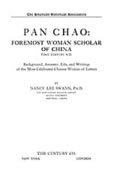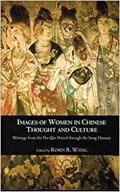start > Klassieke teksten > Late Han tot Tang > tekst
女誡 Nü jie
Nǚjiè [Nü Chieh]
Engelse titel: Lessons for women ook Instructions for daughters
Ban Zhao is het meest bekend van haar verhandeling, Nü jie 女誡 (Instructions for daughters), een gids voor jonge vrouwen over het juiste gedrag.
Ban Zhao, de zus van Ban Gu, schreefloos mee aan de Han Shu.
Ook scheef ze gedichten (Fu) Idema: "the first woman to write a significant body of work in all of the genres of literature of her time” (Idema 2004 p. 18)
De Nü jie (ong 106 na Chr) handelt over de vier deugden waarover een vrouw moet beschikken: proper virtue, proper speech, proper countenance, and proper conduct.
Het boek beschrijft de status en positie van vrouwen in de samenleving (bron Wikipedia).
Chen Yu-Shih schrijft: "Once we start to ask this question about the beginning of idealized womanhood in China, a number of early texts relevant to the subject quickly come to mind. Among them, Pan Chao's (A.D. 45-120) Nu Chieh (allegedly written in A.D. 106) occupies a unique place, not only because it was the first text on what constitutes ideal womanhood, but also because it provided a systematic set of instructions on how to educate unmarried girls to fulfill that role in an everyday context." (Chen 1996)
Swann schrijft: "Indisputably the "Lessons" were designed to meet the needs of the women of the period ... Although the classical writings which she knew and loved are filled with moral teachings illustrated by precept and example, there existed then no treatise especially devoted to the practical everyday life of woman in the home. It was from her own studies and experiences that Pan Chao evolved her ethical system with its homely rules for training girls in personal deportment and right appreciation of family relationships. (geciteerd in Chen 1996)
Indeling tekst
Hieronder geven we de indeling van Swann 1932
Preface
1 卑弱 Bēi ruò - Humility
2 夫婦 Fūfù - Husband and Wife
3 敬慎 Jìng shèn - Respect and Caution.
4 婦行 Fù xíng - Womanly Qualifications
5 專心 Zhuānxīn - Whole-hearted Devotion
6 曲從 Qū cóng - Implicit Obedience
7 叔妹 Shū mèi - Harmony with Younger Brothers- and Sisters-in-law.
Literatuur en vertalingen
Toelichting bij de literatuur
Zie ook:
- Knechtgens 2010. Ancient and Early Medieval Chinese Literature vol 1 p20- 23
- Idema, Wilt en Grant, Beata 2004. The Red Brush: Writing Women of Imperial China. Hst 1 Women On and Behind the Throne, paragraaf Ban Zhao (p 17-42.)
- Goldin 2005 After Confucius hst 7 'Ban Zhao in Her Time and in Ours' p 112-118
Hieronder kunt u een selectie maken van de verschillende publicatievormen en de taal. Ik beperk me tot vier taalgebieden (Nederlands, Engels, Frans en Duits). De meeste literatuur is overigens engelstalig. U kunt bij teksttype ook apart de vertalingen selecteren en U kunt desgewenst ook een specifieke auteur zoeken.
Boeken 1 tot 4 van de 4

Chen, Yu-Shih (1996). The historical template of Pan Chao's Nü Chieh. T'Oung Pao, Vol. 82, pag. 229-257. *.

Lee, Lin-Lee (2009). Inventing Familial Agency from Powerlessness: Ban Zhaos Lessons for Women. *.
Swann, Nancy Lee (1932). Pan Chao, foremost woman scholar of China, first century A.D. : background, ancestry, life, and writings of the most celebrated Chinese woman of letters. *
Ook online.
Meer informatie...
Wang, Robin R. (2003). Images of Women in Chinese Thought and Culture: Writings from the Pre-Qin period through the Song Dynasty. Hackett Publishing Company. *
ISBN13: 978-0872206519
Meer informatie...
Boeken 1 tot 4 van de 4


